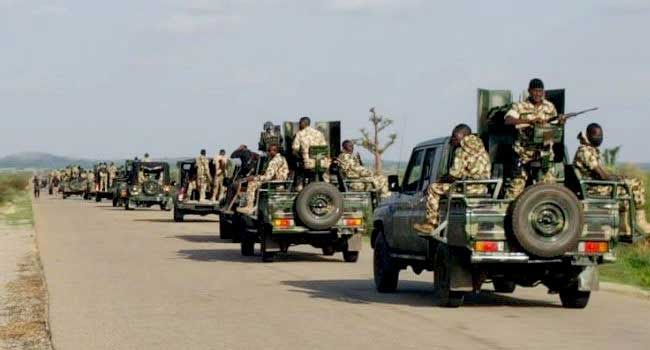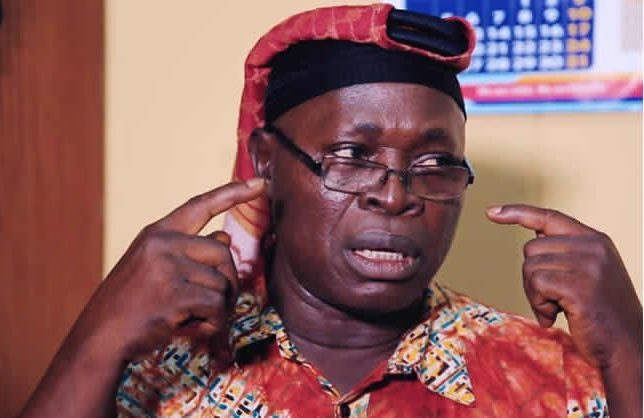 BEING A GUEST LECTURE, BY GEN. IBRAHIM B. BABANGIDA, AT THE PUBLIC PRESENTATION OF THE BLUEPRINT NEWSPAPER
BEING A GUEST LECTURE, BY GEN. IBRAHIM B. BABANGIDA, AT THE PUBLIC PRESENTATION OF THE BLUEPRINT NEWSPAPER
INTRODUCTION
I would like to start this presentation by expressing my heartfelt gratitude to the publishers, management and editors of the Blueprint Newspaper for inviting me to participate in this singularly important occasion in the journey of this young journalistic enterprise. From what I have seen in the early editions of this newspaper I have no doubt that in a few years to come, we would come to the realisation that today marks the beginning of a new form of journalism in this country. The indications are that this paper would eventually lead the way for the growth of a brand of journalism that focusses on critical national issues that not unifies this country, but also prioritises the interests of the vast majority of our people. This is evident even in the choice of the issue I was invited to talk about today.
The manner in which the topic I was invited to speak on is crafted, in my opinion, brings into sharp relief the complexity of the challenges confronting the Nigerian nation today. I am referring here to interwoven tasks of nation-building and development. Each of these issues on their own presents a great enough preoccupation that would command the full attention and energies of any nation. Yet, for us in Nigeria, our reality lies in the interconnection between these two great national challenges. The Developmental challenges that confronted Nigeria for many decades now are, to are large extent, attributable to manner the process of nation-building unfolded in the country; while at the same time, the process of nation-building itself came to be correspondingly impacted by the nation’s developmental dilemma. In the context of our national life, these two are not only historically connected but that any effort devoted to promoting one of them requires paying similar amount of attention to the other. Our quest for national development must therefore proceed within the context of integrated agenda for nation-building.
It is my humble opinion that the pursuit of above values constitute a very worthy agenda for both the leadership and citizens of this country.
THE IDEA OF DEVELOPMENT
The questions that readily suggest themselves at this juncture include: what is Development? How do nations plan their development? Is development synonymous with economic growth considering the way the two concepts are lumped together in the tittle of this presentation? How does the process of nation-building impact on a nation’s development? In my attempt to recommend an agenda for the Nigerian nation in the years to follow, I will attempt to answer these and similar questions that impinge on the on-going quest by our nation to fulfil its destiny as the largest black nation on earth.
Before delving into the questions itemised above, it is important to state that, the fact that the issues in question are still topical and being discussed today is an indication of how intractable the quest for “Development”, that has been launched in this nation since the dawn of independence, had been. Why are we still grappling with this question today? In my opinion, the problem lies with the very meaning that we attach to the word development. Is development necessarily the same thing with the social, economic and political structures and attainments that are found in countries that we today refer to as “developed”? Is there one single trajectory for the attainment of development? My answer is certainly in the negative. Development is a journey not a destination. The quest for development therefore remains unending in all societies whatever may be the level or nature of their current station.
Let me hasten to add that I am not recommending that we reinvent the wheel of development or that we should refuse to learn from the experiences of other regions of the world. There are many common desirable human values that people regardless of their background all aspire to. The point I am making, however, is that each country commences the journey of development based on its unique reality. It is this reality, based on its history, social composition and peculiar cultural attributes, that would determine the trajectory it would follow and the destination that it would chart for itself. The question therefore is how has Nigeria fared in this regard?
My candid opinion is that a lot has been achieved in the few decades of our existence as a unified country, yet so much remains to be done to reach a point where we can comfortably continue this unending journey with relative ease. Our agenda as a nation therefore should be how to attain this critical threshold where most of the basic issues regarding our nationhood and livelihood are settled, as we commence the unending quest for continuous growth and transformation. In detailing out this agenda, I will go back to the questions I raised earlier on the idea of development itself and related processes.
In trying to make some sense on the meaning of development, I would borrow the words of the famous global scholar and Nigeria’s own Prof. Adebayo Adedeji when he insisted that “the development process must put the individual at the very centre of the development effort”. And that it must not “alienate man from from his society and culture but rather develops his self confidence in himself and identifies his interest with those of his society”. In this way, development organically connects the individual to his society and create a communality of interest between them. Development, therefore, is simultaneously about the individual and his needs, interests and aspirations; and beyond him to the interest of his society and its collective need for continuous growth and transformation. Development, in this sense, is the attainment of that state in a social setting whereby the economic, social and political needs of the individual and the larger community can be attended to continuously in a relatively satisfactory manner.
Evidently, development involves much more than the attainment of material growth within the economic realm. There are very many social, political and cultural requirements in creating a wholesome individual and a wholesome society. Nevertheless, economic growth remains a key pillar in any process of development. It creates the necessary capabilities and competences both for the individual and the society to realise their potentials in the social, political and cultural realms on a continuous basis. In this way, economic growth becomes a foundational requirement for development. It is for this reason that modern societies devote a disproportionate amount of time, energy, resources and resourcefulness in the pursuit of economic growth. Before elaborating further on economic growth, I would return to the question of the intricate relationship between development and nation-building that I alluded to earlier on as it affects our country.
THE CHALLENGE OF DEVELOPMENT IN A MULTI-CULTURAL SOCIETY
The most fundamental characteristic of the Nigerian nation is its diversity. The country, like many others, is constituted in a complex amalgam of cultures, ethnic identities, religious adherences and regional backgrounds. I must, however, hasten to say that on its own our diversity is not a problem, but only becomes so when it is mobilised to serve various political purposes by the elite. The resultant fragmentation had, and continue to have, very grave consequences for the on-going process of nation-building. Indeed, if there is any single theme running through the political history of the Nigerian nation, it is the constant battle to counter the disruptive tendencies resulting from the mobilisation of our diversity for political purposes. It is truly unfortunate that many key issues relating to our nationhood remained unsettled. Our many decades of Statehood had failed to create the framework for significantly transforming the particularistic senses of identity in ethnic, regional and religious terms into a strong Nigerian national identity. The all important task of nation-building has for long been left to chance or been conducted in a haphazard and half-hearted manner. In this lies the biggest challenge in the country’s quest to register any significant degree of development.
The consequences of the above are many, especially in terms of the ability of our nation to rise up to the challenge of development in the contemporary era. In the first place, the Nigerian State which is supposed to be the main instrument for enabling the development process remained constantly challenged by issues of legitimacy as to cripple its ability to perform this role effectively. In addition, State institutions remained too weak to play the enabling role required of them. Above all, the required ideological consensus on the trajectory of the nation among the leading elite of the country simply failed to materialised. When all these are coupled up with the perennial instability resulting from the negative mobilization of our diversity, one can then appreciate the failure of the Nigerian State to perform the proper role of mobilisation the people to significantly change and transform their lives.
Having said all the above, we have no option but the face the fact that our diversity is not going to disappear, and disintegration is not an option that Nigeria and its people can afford. In the first place, the historical association between the different communities currently in Nigeria predated the creation of the country. Consequently, we have been for long intertwined by criss-crossing political, cultural and economic ties that cannot be untangled. Secondly, contemporary global trends point to the fact that the future belongs to big nations with large populations that can stand on their own in the international community. China and India readily come to mind as good examples of big and diverse nations that are attending to the twin challenges of Development and Nation-building successfully in an integrated and systematic manner.
In the above lies the strategic challenge facing Nigeria today, that is to integrate the twin processes of nation-building and development into a consolidated national plan. We must focus on the evolution of a truly Nigerian citizen, not in the formal sense of holding the green passport or just inhabiting a given territory, but in the normative sense of feelings of belonging and deeply held sense of allegiance to the nation. Our particularistic sense of identity in ethnic, regional and religious terms graduates into a patriotic sense bond between the citizens and their nation.
How do we achieve this? This can certainly not be achieved through exhortations and sloganeering. This can only materialise through consciously and deliberately attending to the reciprocal interchange of Rights, Duties and Obligations between the individual Nigerian and the nation. This, then is where the question of development as discussed above comes into play.
SHARED ECONOMIC GROWTH AS THE FOUNDATION OF DEVELOPMENT
Development does not occur by chance, it is a deliberate and all-engaging process that society consciously aspires to and set out to achieve. Modern society has no other instrument for the initiation and prosecution of this process than the State apparatus. I must add, however, that the State is not, and should not be made into, the Alpha and Omega of the development process. The State’s role must be limited to that of creating the enabling environment for the people to mobilise their immense energies and resourcefulness in achieving their personal goals and aspiration. In this regard, the State must have certain key attributes:
0. It must have the ability to construct a vision of the trajectory on which to guide the nation in its effort to attend to the needs, interests and aspirations of its people (National Plan).
1. It must create and generate the necessary national consensus on what vision it is promoting for its nation.
2. It must also develop the necessary organisational and technical ability to monitor and regulate how people go about actualising their aspirations within this vision.
3. Above all, the State must come up with mechanisms for ensuring the rewards and outcome of this vision are widely shared and equitably accessed.
The above are the key attributes that successful States across the global operate within in the efforts to promote the development of their peoples and societies. The conduct of public policy in all areas, including in the critical area of promoting economic growth are guide by these considerations.
In promoting economic growth, the role of the State in today’s world is already cut out for it. It must among other things ensure that:
4. The necessary macroeconomic stability in terms of the certain aggregate economic indices such as employment, inflation, savings and interest rates, etc are maintained.
5. The required infrastructure is adequately made available for continuos functioning of the economy.
6. The development of the human capital in terms of education, health and other facilities are provided
7. A secure and stable environment with adequate legal safeguards and access to justice.
More than all the above technical issues, however, is to ensure that the rewards and outcome of the vision is Equitable and Sustainable. In this regard, the process of economic growth and Development in general must address the issue of Poverty and Environmental sustainability. The principle of shared and sustainable growth is a platform upon a government can easily mobilise the populace and create the much required national consensus.
It is true that traditional economic thinking assumes that economic growth whenever it ensures, automatically generates the required employment and eventually addresses poverty through some trickle down effect. This may certainly be the case, but just to a limit; a poor country with the kind of developmental and nation-building challenges such as Nigeria cannot afford to leave the resolution of its most important challenges to the impersonal processes of economic growth. Economic growth must therefore be a managed process, with a deliberate objective of enhancing the desirable outcomes, such as job creation and poverty alleviation, and minimizing undesirable ones such environmental degradation.
In my opinion, economic growth must therefore have the following attributes to meet the criteria of equity and sustainability mentioned above:
8. The process of economic growth must prioritise job creation as a central objective. In this regard all policies, programmes and project should be justified in terms of their potential for generating employment for the teeming number of Nigerians, especially the millions of school leavers that our educational system churns out annually.
9. Deliberate and conscious effort to promote Small and Medium scale enterprises.
This would not only further enhance employment generation, but also provide the necessary goods and service required for alleviation of poverty on massive scale.
10. Encourage agriculture and aggro-allied industrialisation. The capacity of the agricultural sector to provides employment on a mass scale and provide the raw materials for industries, in addition to food security for the nation are obvious to warrant any further comment.
11. The process must ensure the natural endowments that are to be used in the course of ensuring economic growth are exploited in a responsible and sustainable manner to protect both the environment and the heritage of coming generations.
The list above is, by no means, exhaustive. The point I am making, however, is that for any process of economic growth to make any sense it must set to impact on the lives of the vast majority of the people in the society in question. This, thus brings us back to the earlier raised issue of the welfare of the individual citizen as being the whole purpose of the development.
CONCLUSION
In concluding this discussion, I would like to reiterate the fact that where the processes of economic growth and development in general, are constructed around the needs, interests and aspirations of the vast majority of individual citizens, it becomes much easier to development their sense of bond and patriotism to their nation. The sectional and particularistic sense of identity, in ethnic, regional and religious terms, would begin to recede and would eventually loose their potency in creating disruptions and instability in the nation. In this way, the twin processes of Development and Nation-building become mutually reinforcing for the good of all in the nation.
Before returning to my seat, I would like to, once more, thank the organisers of this event for the singular honour done to me. I wish the Blueprint newspaper the Almighty Allah’s guidance in the journey they have just embarked on for informing, educating and guiding our nation through their chosen medium. I thank you for listening.



